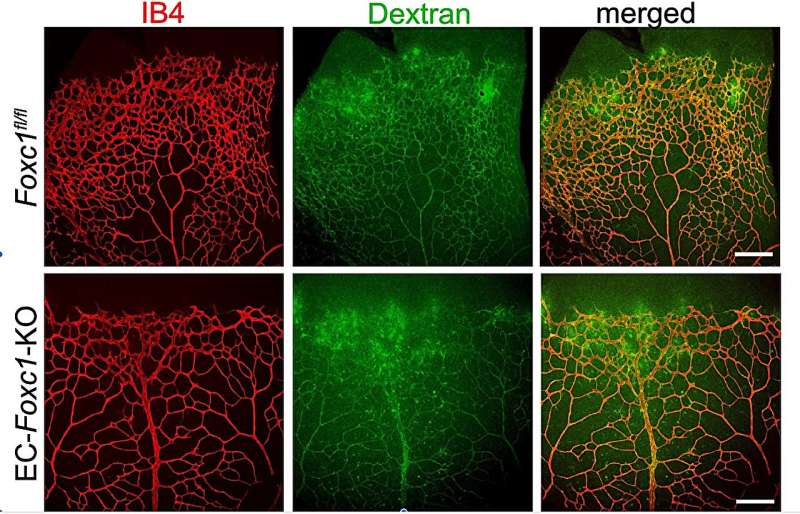This article has been reviewed according to Science X's editorial process and policies. Editors have highlighted the following attributes while ensuring the content's credibility:
fact-checked
peer-reviewed publication
trusted source
proofread
Genetic mechanisms may reveal retinal vascular disease therapeutic targets

Investigators led by Tsutomu Kume, Ph.D., professor of Medicine in the Division of Cardiology and of Pharmacology, have identified novel genetic mechanisms that regulate blood vessel growth in the retina and may also serve as therapeutic targets for retinal vascular disease, according to a Northwestern Medicine study published in Nature Communications.
Angiogenesis is the formation of new blood vessels from endothelial cells in existing blood vessels, a process essential for developing new organ systems and promoting tissue repair. While the molecular mechanisms of angiogenesis have been previously established, the precise genetic mechanisms that also help regulate this process have remained elusive.
Previous work from Kume's laboratory and others suggests that mutations in the FOXC1 and FOXC2 genes are associated with various vascular developmental defects. In the current study, the investigators studied retinal tissue from vascular endothelial cell-specific FOXC-knockout mouse lines to determine the role of FOXC1 and FOXC2 in the transcriptional regulation of retinal angiogenesis.
The investigators found that mice with the FOXC1-knockout demonstrated impaired retinal vascular growth and the expression of the SLC3As and SLC7A5, genes which encode CD98, an essential amino acid transporter. Furthermore, this impaired gene expression inhibited the activation of the mammalian target of rapamycin (mTOR) signaling pathway, which is essential for cellular growth and proliferation.
Using the oxygen-induced retinopathy mouse model for studying the mechanisms associated with the pathogenesis of retinopathy of prematurity, a major cause of acquired blindness in children, the investigators also found that FOXC1 is necessary for revascularization of the retina during oxygen-induced retinopathy.
"This suggests that FOXC1 is also important for the pathological retinal angiogenesis," said Kume, who is also a professor of Ophthalmology.
Additional analyses also revealed that FOXC1 is crucial for the maintenance of pericytes—cells which help form the walls of blood vessels—and support the blood-retinal barrier during retinal angiogenesis.
"Pericyte loss is critical for another eye disease: diabetic retinopathy. During disease progression, the blood vessels are damaged and eventually the pericytes are lost, and then the blood vessels become leaky," Kume said.
The findings demonstrate that FOXC1 is a key transcriptional regulator for blood vessel growth and the development of the retinal vasculature. The findings may inform future therapeutic strategies for treating retinal vascular disease.
"I am particularly excited about continuing our current collaboration with Dr. Kume to pursue this line of investigation, particularly as it relates to finding new therapeutic targets for diabetic retinopathy and other ischemic retinopathies, and continuing to improve our understanding of these sight-threatening diseases," said Amani Fawzi, MD, the Cyrus Tang and Lee Jampol Professor of Ophthalmology and a co-author of the study.
"These results not only advance the current understanding of transcriptional mechanisms contributing to physiological retina development but also identify amino acid metabolism as a potential therapeutic target for the treatment of FOXC1-associated vascular anomalies, such as cerebral small vessel disease," the authors wrote.
More information: Teena Bhakuni et al, FOXC1 regulates endothelial CD98 (LAT1/4F2hc) expression in retinal angiogenesis and blood-retina barrier formation, Nature Communications (2024). DOI: 10.1038/s41467-024-48134-2



















